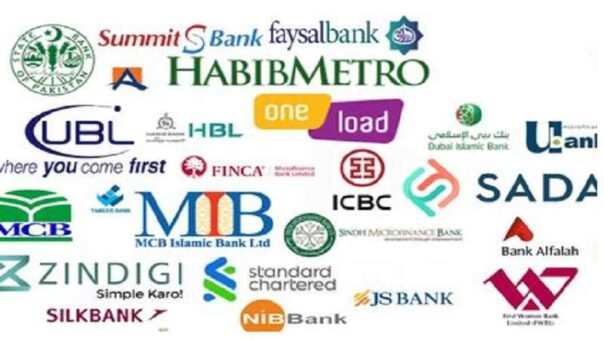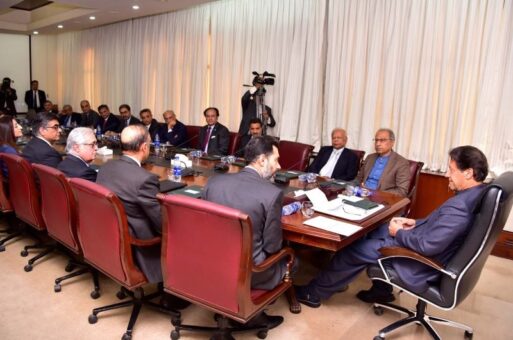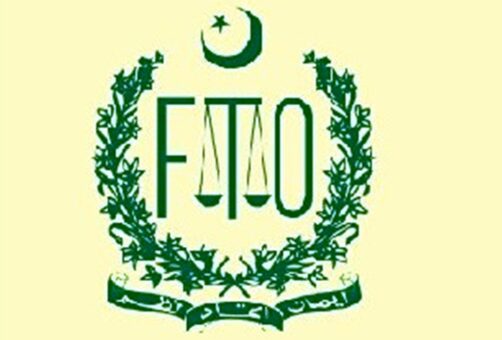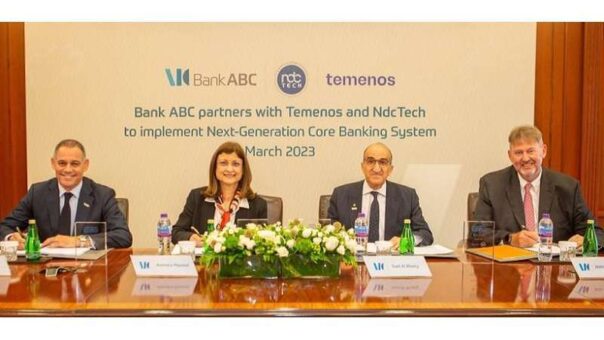Islamabad, June 22, 2023: The Federal Tax Ombudsman (FTO) has directed the Federal Board of Revenue (FBR) to regularly conduct audit of banks to check compliance with the withholding tax provisions.
(more…)Tag: banks
-

Slow economic growth puts Pakistan’s banking sector at risk of NPLs
KARACHI: Pakistan’s banking sector is facing a threat from non-performing loans (NPLs) due to slow economic growth, according to analysts at KTrade Research.
(more…) -

Pakistani banks get tax relief amid record high interest rates
KARACHI: Pakistani government has granted tax relief to commercial banks despite the banks are making huge profits in the wake of record high interest rates.
(more…) -

High tax may erode banks’ earnings up to 20%
KARACHI: The proposed corporate tax rate for banks may erode earnings of the sector by up to 20 per cent on annual basis.
The government presented federal budget on June 10, 2022 and proposed enhancement in tax rates for banking companies.
READ MORE: Pakistan slaps 45% corporate tax on banks
The government announced various taxation measures on the banking sector in the Budget 2022/2023. This includes i) increase in corporate tax to 45 per cent against existing 35 per cent, ii) imposition of poverty alleviation tax of 2 per cent and iii) hike in tax rate in case of adverse Asset to Deposit Ratio (ADR).
New rates would be applicable from Jul 1, 2022 subject to the approval of National Assembly.
READ MORE: Tax rates for business individuals, AOPs during TY2023
Analysts at KTrade expect this development to erode the KTrade’s banking sector earnings by 15 per cent – 20 per cent cumulatively, on an annual basis. Consequently, they have revised down target prices by 15 per cent.
1) Corporate tax enhanced to 45 per cent: The government proposed to increase the taxation to 45 per cent from 2023 onwards in order to meet the direct tax collection target of Rs2.6 trillion for 2022-2023. The analysts expect this to erode banking sector’s earnings by an average of 10.5 per cent on an annual basis.
READ MORE: Pakistan reintroduces advance tax on foreign payments
Type of Tax 2022 2023 and onwards Corporate Tax 35 per cent 45 per cent Super Tax 4 per cent 0 per cent Poverty Alleviation Tax 2 per cent 2 per cent 2) Adverse tax measures on low ADR: Banks would face higher taxation if the ADR threshold falls below 50 per cent. As a reminder, average ADR of banking sector improved to 48.5 per cent in Mar22 as opposed to 45.2 per cent in the same period last year. New rates as per the Finance Bill are as follows:
READ MORE: Exchange companies to withhold tax on payment to MTOs
Gross Advances to Deposits Ratio Existing Rate of Tax Proposed Rate of Tax Upto 40 per cent 40.0 per cent 55.0 per cent 40 per cent – 50 per cent 37.5 per cent 49.0 per cent Exceeding 50 per cent 35.0 per cent 45.0 per cent Within Ktrade universe, the analysts highlight BAFL, MEBL and HBL to remain immune because of exceeding the threshold ADR with ADR standing at 60 per cent, 54 per cent, and 50 per cent respectively.
Meanwhile, UBL, MCB and ABL with ADR of 45 per cent would face the negative consequences of higher taxation of 49 per cent.
This would result in further earnings attrition to the tune of 7 per cent for the said companies.
-

Pakistan banks register record profit in 1Q2022
KARACHI: Pakistan banks have posted a record profit of Rs81 billion during first quarter of the calendar year 2022, analysts said at Topline Securities.
The profitability of the listed banks surged by 28 per cent on year on year (YoY) basis and 19 per cent on Quarter on Quarter (QoQ) basis.
READ MORE: MCB Bank finalizing Easypaisa acquisition
Net Interest Income (NII) of the banks drove sector’s profitability growing by 21 per cent YoY to Rs220 billion due to rising asset yields. Markup interest earned on earnings assets was up 48 per cent YoY to Rs564 billion whereas markup interest expense on interest bearing deposits and liabilities were up 72 per cent YoY to Rs344 billion.
The analysts expect NII of the sector to remain strong in the second quarter of 2022 and third quarter of 2022 as well as asset reprising is likely to complete by third quarter of 2022 given recent hike in Kibor and T-Bill/PIB rates.
READ MORE: Pak Kuwait Investment, Enertech sign $750 million pact
Sharp drop in provisioning expense also supported sector’s profitability as it declined by 80 per cent to Rs1.6 billion in first quarter of 2022 led by macro recovery and improved asset quality.
With sector’s coverage ratio close to 100 per cent, risk to abrupt increase in provision charge going ahead is minimal.
Non-interest expense of the sector was also up 19 per cent YoY with major contributions coming from Habib Bank (+27 per cent to Rs31 billion), National Bank of Pakistan (+16 per cent to Rs17 billion), and Bank Al-Habib (+25 per cent to Rs11.9 billion).
READ MORE: National Saving Schemes facilitation portal launched
In terms of NII growth, MEBL, Bank Alfalah (BAFL) and SCBPL posted growth of 42 per cent, 38 per cent, and 36 per cent respectively on YoY basis.
In first quarter of 2022, Standard Chartered Bank (SCBPL) and Meezan Bank (MEBL) posted highest earnings growth of 119 per cent and 51 per cent YoY, respectively. On other hand, Soneri Bank (SNBL) and Bank of Khyber (BOK) registered YoY earnings decline of 31 per cent and 11 per cent.
The analysts said they had taken all listed banks that have announced their results.
-

Banks provide information of deposits, withdrawals
Section 165A of Income Tax Ordinance, 2001 has made it mandatory for banks to provide details of cash deposits and cash withdrawals to the tax authorities.
The Federal Board of Revenue (FBR) issued the Income Tax Ordinance, 2001 updated up to June 30, 2021. The Ordinance incorporated amendments brought through Finance Act, 2021.
Following is the text of Section 165A of the Income Tax Ordinance, 2001:
165A. Furnishing of information by banks.— (1) Notwithstanding anything contained in any law for the time being in force including but not limited to the Banking Companies Ordinance, 1962 (LVII of 1962), the Protection of Economic Reforms Act, 1992 (XII of 1992), the Foreign Exchange Regulation Act, 1947 (VII of 1947) and the regulations made under the State Bank of Pakistan Act, 1956 (XXXIII of 1956), if any, on the subject every banking company shall make arrangements to provide to the Board in the prescribed form and manner,—
(a) a list of persons containing particulars of cash withdrawals exceeding fifty thousand Rupees in a day and tax deductions thereon, aggregating to Rupees one million or more during each preceding calendar month.”;
(b) a list containing particulars of deposits aggregating rupees ten million or more made during the preceding calendar month;
(c) a list of payments made by any person against bills raised in respect of a credit card issued to that person, aggregating to rupees two hundred thousand or more during the preceding calendar month;
“(d) a list of persons receiving profit on debt and tax deductions thereon during preceding financial year.”
(2) Each banking company shall also make arrangements to nominate a senior officer at the head office to coordinate with the Board for provision of any information and documents in addition to those listed in sub-section (1), as may be required by the Board.
(3) The banking companies and their officers shall not be liable to any civil, criminal or disciplinary proceedings against them for furnishing information required under this Ordinance.
(4) Subject to section 216, all information received under this section shall be used only for tax purposes and kept confidential. (Disclaimer: The text of above section is only for information. Team PkRevenue.com makes all efforts to provide the correct version of the text. However, the team PkRevenue.com is not responsible for any error or omission.)
-

Corporate, super tax rates should be aligned for banks
KARACHI: Federal Board of Revenue (FBR) has been proposed to bring down the corporate tax rate for banks at par with other corporate sector and also treatment of super tax for banking companies aligned with other taxpayers.
The banks are paying 35 percent income tax whereas the corporate tax rate for other sectors is 29 percent. Likewise, super tax at four percent is applicable on banks.
Overseas Investors Chamber of Commerce and Industry (OICCI) in its budget proposals for 2020/2021 submitted to the FBR, highlighted that the banking sector tax rates are not aligned with the general corporate tax rates.
Furthermore, through Finance Supplementary (Second Amendment) Bill 2019, Super Tax at 4 percent is made applicable on banks from tax year 2018 to tax year 2021.
The OICCI recommended that corporate tax rates for the banking sector should be aligned with other sectors.
Meanwhile, super tax relief, as granted to other industries, should be given to banking sector as well.
The OICCI also highlighted tax deduction on profit on debt under section 151 of Income Tax Ordinance, 2001.
Through Circular No.1/2-STB/2019 dated 26th July 2019, FBR has clarified that withholding tax under section 151 shall be deducted on the basis of cumulative profit paid in a tax year.
The circular is in contradiction with the Act, which requires that withholding tax shall be deducted on payment basis.
The circular should be withdrawn, to avoid litigation between banks and department.
There should be a uniform withholding tax rate of 15 percent for all payments of profit on debt.
The OICCI pointed out Section 165 and 165A of Income Tax Ordinance 2001related to submission of statements and information by the banks.
The Clause (81A) of Part IV to the Second Schedule was inserted vide the Finance (Second Amendment) Act 2019 to exclude the reporting requirements under section 165 of Income Tax Ordinance, 2001 with respect to withholding tax under section 151 (Profit on Debt) and 231A (Cash Withdrawal) since both the withholding sections are required to be reported under section 165A.
The clause was abolished vide Finance Act 2019, resulting in duplication of reporting i.e. withholding tax under section 151 and 231A has to be reported, with a threshold, under section 165A on monthly basis and again under section 165 on bi-annual basis, but without any threshold i.e., withholding tax of even Re 1 has to be reported under section 165A.
Therefore, the OICCI recommended that Clause (81A) of Part IV to the Second Schedule should be restored to avoid duplication of reporting and handling of voluminous data for immaterial withholding tax transactions, which is not clear.
Alternatively, reporting requirement of section 165A for both these sections (151 and 231A) should be deleted to avoid double reporting.
-

Prime Minister welcomes banks’ proposals for revival of sick industrial units
ISLAMABAD: Prime Minister Imran Khan on Tuesday welcomed proposals of banks for revival of sick industrial units.
A delegation of prominent bankers of the country called on Prime Minister Imran Khan in Islamabad.
Prime Minister Imran Khan welcomed the proposals of the banking community particularly those related to the revival of the sick industrial units.
Adviser to PM on Finance Dr. Abdul Hafeez Shaikh, Adviser to PM on Institutional Reforms Dr. Ishrat Hussain, Governor State Bank of Pakistan Syed Reza Baqir and senior officials of the Government were present during the meeting.
The bankers apprised the Prime Minister about the issues concerning banking sector in terms of financing for accelerating the economic activities aimed at wealth creation and presented various suggestions to overcome issues being encountered.
The Prime Minister stated that the Government is working relentlessly for economic growth and sustained positive sentiments, domestically as well as externally.
The Prime Minister highlighted human resource potential of the country with enterprising youth in majority; we need to channelize their energies through skill development thereby enabling them to contribute towards economic development.
The Prime Minister said that the present Government is focused on reviving sick industrial units and promoting the SMEs, as they are essential for wealth creation and generation of employment opportunities.
The Prime Minister appreciated the proposals of the delegation and assured maximum facilitation.
The meeting was informed that Corporate Restructuring Company has been established to take over sick industrial units for the purpose of reviving the commercially or financially distressed companies thereby making them profitable with consultation of all the stakeholders.
-

Banks to provide details of persons receiving profit on debt
ISLAMABAD: Banks will provide certain information of persons receiving profits on their deposits to the Federal Board of Revenue (FBR) after amendment in the tax rules, sources said on Monday.
The sources said that the banks will provide details of depositors receiving profit on debt, including name, CNIC, most recent particulars including address, amount of profit on debt during the year, tax deducted etc.
The banks are required to provide information of persons receiving profit on debt exceeding Rs500,000 during the financial year.
According to the FBR, every banking company officer, shall file electronically on FBR’s web portal the Account Holders Deposits Statement and Credit Card Payments Statement and Cash Withdrawal Statement as specified in Form „A‟ and Form ‘B’ respectively, for immediately preceding calendar biannually.
Every banking company officer shall furnish to the Board an annual Written off Loans Statement as specified in Form „C’ for immediately preceding calendar year within three months of the end of the preceding calendar year.
Every banking company officer, shall furnish to the Board a copy of each currency transactions report and suspicious transactions report generated by it at the time it is submitted to the Financial Monitoring Unit under the Anti-Money Laundering Act, 2010 (VII of 2010).
Every banking company officer, shall furnish to the Board any information and documents in addition to those mentioned in sub-rules (1) to (3) within the time allowed by the Board.

